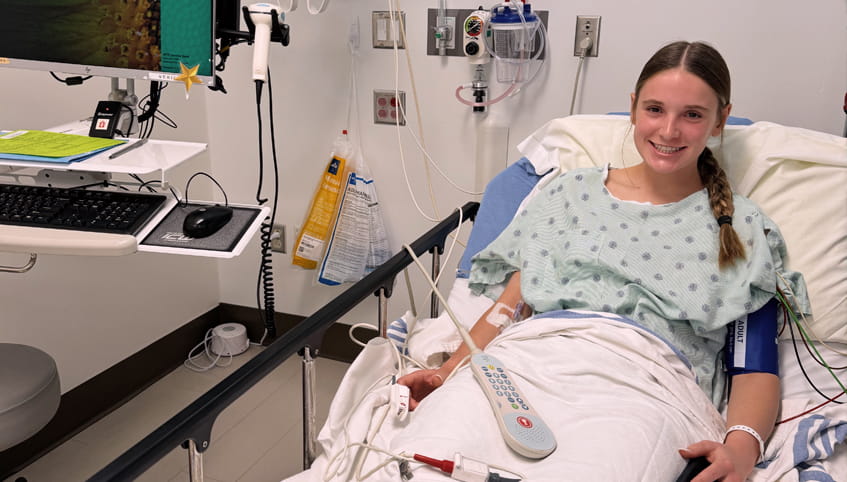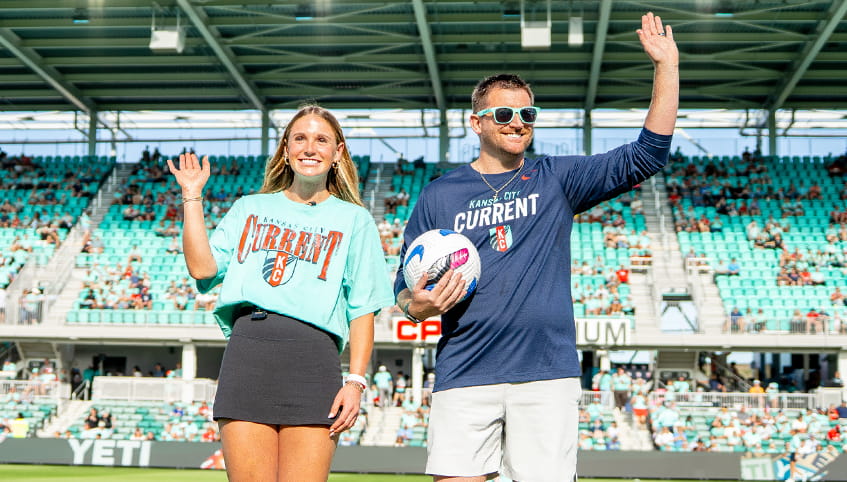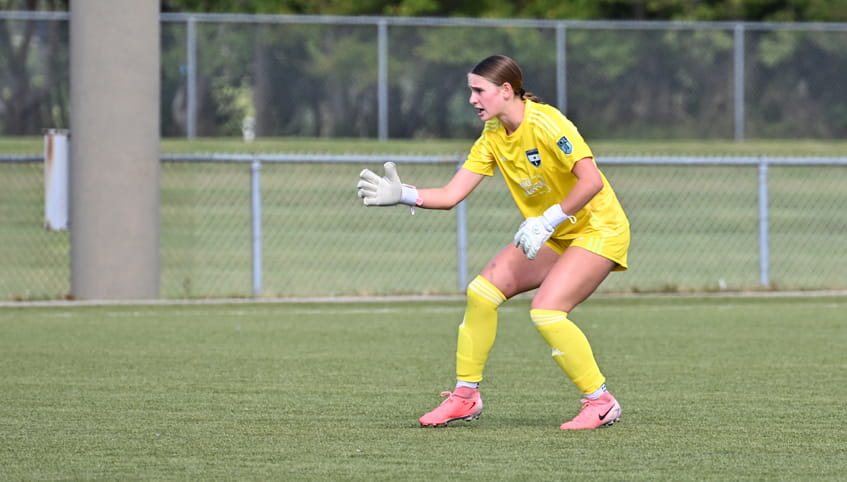November 24, 2025
Athletes know how important it is to work as a team. When Kate Ingram needed help identifying, treating and recovering from several medical issues preventing her from playing soccer, she sought out an elite team at the health system that was even larger than she expected.
Kate’s 18-month journey to getting back on the pitch included 3 physicians, 5 surgical procedures, 2 athletic trainers, a physical therapist, dietitian and sport psychologist.
“Kate used every resource as a health system that we have for our female athletes,” says Lisa Vopat, MD, a sports medicine physician and director of the female athlete program. “Kate is a story of resiliency. There was a period of significant uncertainty for her and what this meant for her athletic goals and her future in addition to dealing with the daily pain. She showed that you don’t have to do it alone. You can lean on all your resources, whether it be psychology or nutrition or multiple providers or your parents. You don’t have to do it by yourself.”
The best part is I feel completely pain-free in my legs. I didn't know if that was going to happen. I'm so grateful for Dr. (Bryan) Vopat and everybody who has helped me get to where I am today." Kate Ingram
Kate Ingram: My name is Kate and I’m a part of the female athlete program at The University of Kansas Health System. I got the opportunity to go out to the training center on Wednesday. I also got to meet Lorena, which was super cool. So we got to talk and got to bond over both being goalkeepers, and I got her jersey too. She’s awesome, she’s fearless in the box, she’s back there supporting everybody. She’s just kind of the glue to the team.
Kate: So it all kind of started in April of 2024. I started to experience a lot of different symptoms in my calves, in my shins, so I went in and saw some doctors at The University of Kansas Health System. I was diagnosed with chronic exertional compartment syndrome, popliteal artery entrapment syndrome and peroneal nerve entrapment in both legs.
Kate: Going through 5 surgeries in 18 months at such a young age was definitely difficult for sure. I had played soccer all my life and kind of in an instant it was taken away from me. It’s changed my perspective a lot. It changed my love for the game, and it really, just shapes you just to have such gratitude for not only what your body is able to do for you but just the simple things in life.
Kate: I’ve been going through this journey for the past 18, 19 months and so this kind of feels like the finish line.
Kate: Congrats on your shutouts! That’s so exciting.
Lorena: Thank you, I am so happy for the new record. Hey, I have one present for you, wait here.
Kate: Okay, thank you. Oh my gosh!
Kate’s mom: Oh my gosh, Kate!
Kate: Thank you, this means the world.
Kate: The game was awesome, I had a super fun experience. Thank you so much to The University of Kansas Health System and the KC Current for having me.
The gray area
Kate’s story started many years before she was referred to the health system. As a competitive soccer goalkeeper, Kate says she noticed a tight feeling in her calves for years. But the pain escalated to cramping and started to include shin splints. In early 2024, she made the varsity team at Blue Valley West as a freshman, but her excitement was tempered by the increasing levels of fatigue she was feeling in her legs.
Her high school coach started to notice Kate’s ankle would give out when she was planting her foot, so he sent her to see Tyler Sleeper, West’s athletic trainer and a member of the health system. He in turn referred Kate to sports medicine physician JP Darche, MD. Dr. Darche suspected peroneal nerve entrapment and sent Kate for testing, which would take about 2 weeks. He told her to stop playing in the meantime to avoid additional injury.
“When he said I couldn't play, I was devastated,” says Kate. “I felt like I had worked so hard to get to that position and next thing I know it's stripped away from me. But I was also very hopeful because it was a really quick turn around.”
Orthopedic surgeon Bryan Vopat, MD, performed a nerve release and then Kate took 4 weeks to recover. It was fast enough that she could rejoin her high school season.
“As soon as I stepped back on the field, I could feel that something is still not right,” says Kate.
She explained the symptoms to Dr. Bryan Vopat who identified 2 possible causes – chronic exertional compartment syndrome and popliteal artery entrapment syndrome. An angiogram showed complete occlusion of Kate’s popliteal artery. The team decided to move forward with treatment of the popliteal artery in her right leg, so Kate went back into surgery.
“I'm so grateful (Dr. Bryan Vopat) decided to also test for popliteal entrapment. I think we might have done the compartment syndrome surgery first, and I wouldn't have gotten full relief,” says Kate.
Now it is early 2025, and Kate has been busy rehabbing her legs. She works with Cameron Zimmerman, a physical therapist at the health system, and Krisha Crane, a trainer at the Sports Medicine and Performance Center. But things still aren’t quite right, so Kate was referred to Dr. Lisa Vopat to test for compartment syndrome again.
“Compartment syndrome is progressive, meaning that you have a build up of the pressure where the fascia doesn’t stretch around the muscle compartments. And it progresses and worsens over time, where you become less and less tolerant to exercise and more and more symptomatic,” says Dr. Lisa Vopat. "So, when I saw her, her pressures were not diagnostic for release. They were middle of the road, a little gray.”
Dr. Lisa Vopat noted that Kate had lost weight to a degree that she could be underfueling and affecting her ability to recover, so she referred her to the female athlete program’s dietitian.
“A lot of athletes have a mindset that when they're recovering from surgery and in rehab, I must not need to eat as much because I'm not actively in sport. But what I find is that the energy demands of healing from an injury and rehab are just as high as being fully active in sport, if not higher. Our fueling has to remain the same or if not more intentional than it was before,” says Dr. Lisa Vopat.
But even with improved nutrition, Kate’s legs didn’t get better. Both Drs. Vopat conferred with Kate and her family and decided it was time to try the compartment release surgery. She had the compartments released on both legs and had the popliteal artery entrapment surgery on her left leg.
“At the end of the day, she needed all the things for these 3 diagnoses. She had multiple conditions that required surgery that are all connected to each other. But I would say it is rare to have all of them that needed to be treated surgically together,” says Dr. Lisa Vopat. “These are conditions that occur in athletes, and we don't really understand how or why a lot of times that this develops. Like I said, because these diagnoses and the testing are not black and white, they’re very gray, we had to support her from every aspect to try and figure out how to get her better, and it wasn't simple. It's not slam dunk like you tear your ACL, your MRI shows your ACL is torn, you get surgery. In Kate's case, every time I met with her, it was a constant risk-benefit analysis of each treatment.”

Keeping a positive mindset
Dealing with all the uncertainty and ongoing treatment decisions was a challenge for Kate from the very beginning of this journey. Dr. Bryan Vopat referred her to sport psychologist Brett Woods, MD, a few months after her first diagnosis to help with that. But Kate wasn’t sure she needed any help.
“As an athlete, I've always put on that face like, ‘I don't need help. I'm fine.’ My mom kind of pushed me to go once,” says Kate. “The first time I met with (Dr. Woods), I realized I was wrong. He's awesome. I'm grateful that I got pushed a little bit into doing it.”
Kate also got mental support from her rehab team.
“My PT, Cameron Zimmerman, was the greatest light for me through this all. Also, Krisha at the sports performance center. They both were always there for me not just physically but mentally through it all,” says Kate. “Having them around me as my support system meant the world.”
Zimmerman agreed that it was a holistic process.
“It's not just about restoring their movement and getting them back to sport,” he says. “It's partnering with them to rebuild their belief in themselves, and a big part of that is the relationship piece, just making sure that you're building those relationships so there is a level of trust as you progress through that rehab.”
And Zimmerman stressed that the complexity of Kate’s situation required a lot of relationships with and collaboration from the whole team at the health system and female athlete program.
“From Dr. Lisa Vopat to Dr. Woods to one of the athletic trainers at the sports performance center, there was definitely a ton of collaboration trying to make sure we're hitting every point we can and addressing all these things throughout the process,” Zimmerman says.

Back in the game
After 18 months on the sideline, Kate was cleared to return to playing soccer with her club team in September.
“I am feeling so, so good. Having that final appointment of being completely cleared was the biggest sigh of relief. I was crying tears of joy. It's been such a long journey,” says Kate. “The best part is I feel completely pain-free in my legs. I didn't know if that was going to happen. I'm so grateful for Dr. (Bryan) Vopat and everybody who has helped me get to where I am today.”
Zimmerman has continued to work with Kate and said once she returned to playing, she truly lit up with joy. He credits her work for this successful outcome.
“I think her attitude and dedication to training and doing what she needed to do, even when it wasn't easy, was the biggest thing. She showed up every day, even when she was having pain or symptoms weren't going away, just to kind of rebuild,” he says.
Kate is looking ahead to playing a full season of high school soccer and hoping to be recruited to play in college. She has great advice for other athletes facing uncertainty and setbacks.
“I would say it's a long journey and a hard journey. Truly you find pieces of yourself you didn't know you had. Celebrate the small wins,” says Kate. “Perspective is a huge thing. You can look at it from a negative outlook or a positive lens. It's really hard when you're going through it. It feels like a really big valley. But there's brighter days ahead.”






